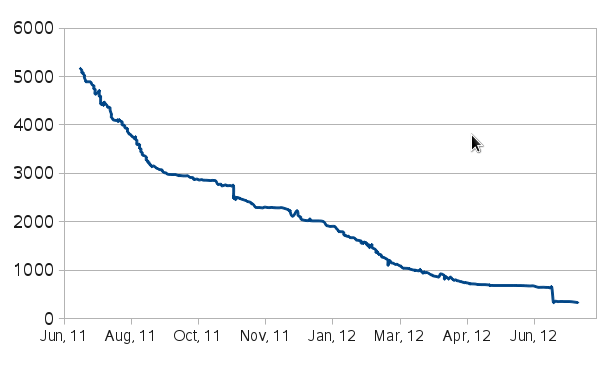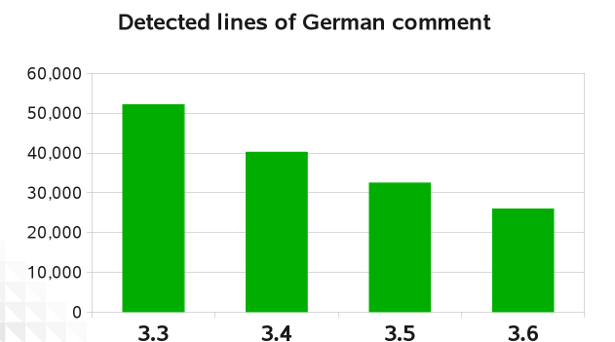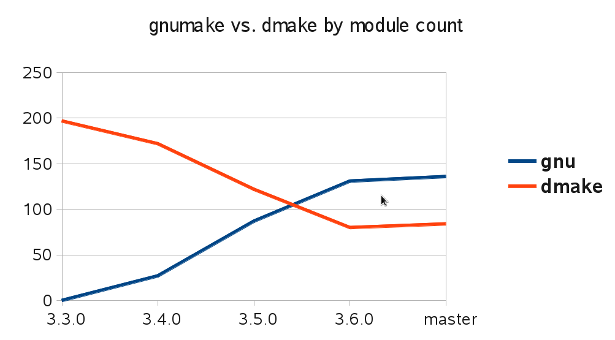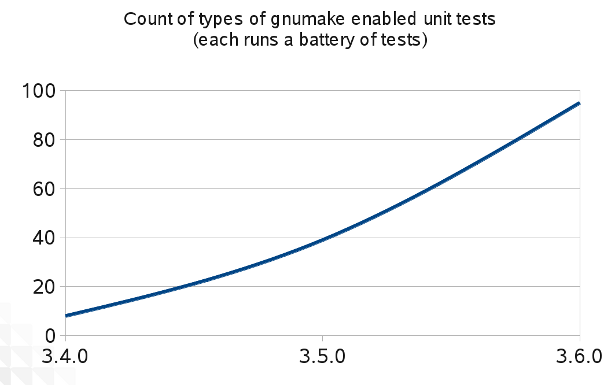Today we released 3.6.0, checkout the new feature summary and release notes. As always a lot more has happened under the hood than can easily be addressed in the features page; so here are some of the behind-the-scenes bits and some of the unsung heros doing the vital, but more hard-to-see work.
Improving extension registration
For this release we introduced new code to improve the way extensions (and built-in components) are registered and looked up. This dungs out a very old and unpleasant piece of the UNO core, replacing it with a rather simpler and cleaner version that performs better - casual callgrind profiling shows some nice wins here.
Unfortunately, for one reason and another, despite a delay for a
fourth release candidate, there are still some circumstances where an
upgrade will not re-register some built-in extensions, and silently exit
on first launch (just re-run it). On the down-side
that can affect spell-checking dictionaries, and (for some) on the
up-side disables Auto-COrrection too. This is already fixed for
3.6.1,
due in three weeks, and can easily be worked around by removing the
extensions/ directory from your user-profile (which will
then be re-generated). Better than that as this has been fixed
Stephan Bergmann has further dunged out the registration /
upgrade code to stop this recurring.
The ESC decided to sticking to our release discipline and cadence to underline the importance of early QA and bug fixing. I'd love to see more people running our daily dev-builds of master and reporting bugs much higher up the food chain, and building good relationships with the grateful developers who just created them. See here for a list of other annoying issues in 3.6.0.
Upgrading the code: dead code
In other areas we've made improvements that are hard to see; one of these is eliminating dead code; here's how we're doing at that: unused methods vs. time - lower is better.

Upgrading the code: German comments
The ongoing charge to translate our remaining German comments
continues to bear fruit. We're around 50% done here - down to around
25k lines (as detected by Miklos' nice bin/find-german-comments
script).

Upgrading the code: fixing the make system
One profound unpleasantness of the OO.o legacy was the custom version of the unusual 'dmake' required to reliably build the code. Some heroic hackers have been taking on the work Bjoern started at Oracle to convert to using GNU make instead. One benefit of this is exposing massive build parallelism - we now have a global view of dependencies for nearly all of our internal code in one GNU make process allowing an incredible degree of parallelism - thousands wide at times: so if you want to actively stress-test your 1024 CPU machine, we can help you.

Upgrading the code: unit tests
One of the most exciting things that has been ongoing in LibreOffice up to 3.6 is the growth in unit tests. In contrast to the various unreliable automated tests that were present before, these are run very regularly. Some we run on every module build (ie. just building calc), and yet more we run on straight-through builds. We aim to spend some small proportion of our compile-time say under 5% building and executing these as widely as possible:

Faster, more readable code
Another thing that can't be seen are the very long overdue
improvements in our basic String classes. Traditionally we've had four
string classes where one would be best - heroically Caolan McNamara
finally killed the ByteString class in 3.6, leaving only three.
With perhaps a greater impact Lubos Lunak spearheaded a fantastic
improvement in good-taste-based-coding with some tweaks to our OUString
class, used almost everywhere. You can see the improvement in this
pseudo diff based on real changes:
- if ( aFlavor.MimeType.indexOf( ::rtl::OUString(RTL_CONSTASCII_USTRINGPARAM( ";Aspect=THUMBNAIL" )) ) != -1 )
- xPropSet->setPropertyValue(::rtl::OUString(RTL_CONSTASCII_USTRINGPARAM("HelpText")), aAny);
+ if ( aFlavor.MimeType.indexOf( ";Aspect=THUMBNAIL" ) != -1 )
+ xPropSet->setPropertyValue("HelpText", aAny);
This sort of change is repeated many, many times. Interestingly in
many cases these make the code not only far more readable, but also produce
smaller, faster code by avoiding intermediate allocations of strings; a great
improvement. Lubos also has some interesting clang plugin in progress
to automatically generate this sort of semantic code upgrade. Using that is
naturally blocked by completing the on-going re-basing
on the Apache licensed version of LibreOffice.
Cross-compiling code
Other major improvements in 3.6 are the ability to do cross-compiles of LibreOffice - Tor Lillqvist did a lot of work here, initially focused on ensuring that the MingW cross-compile for Windows from Linux worked well. This can be run on very fast hardware as a tinderbox to ensure that master remains buildable always. That work has expanded into cross-compilation to Android and iOS both of which continue to develop and improve in master. At the same time Eilidh McAdam for Lanedo has done some great work at cross-compiling .msi files from Linux, re-using wine code - to improve that install flow and move us towards fully Free Software tooling.
Better builds out of the box
Another nice improvement is the growth of big-machine tinderboxes to ensure that we keep master in a buildable state on many platforms at all times. You can checkout the latest build status. With many thanks to Norbert Thiebaud for his time and CPU horsepower donations, and to ByteMark for their generous donation of a very substantial machine for native Win32 building that really helps.
Easier code contribution
Yet another ongoing initiative, is that of improving our code submission process - Bjoern Michaelsen, Norbert Thiebaud, Robert Einsle, David Ostrovsky and others have been working hard to get Gerrit (an automated code submission system) setup. This lets you convert your OpenId account to git push access to a review branch without any interactions, it also has a fine code review flow for submitted patches, and makes including cherry-picking patches, and providing feedback much easier. We plan to migrate our main repository to this shortly, leaving freedesktop as a read-only mirror.
Conclusions
Well, there is much more to say - so many people have done such a lot of work to make 3.6 better; the QA team has been doing a fantastic job triaging incoming bugs and raising their priority / flagging them as Most Annoying - we couldn't work effectively without you guys. The design team have done some really excellent work in 3.6 as well, overall it's an exciting time for LibreOffice. I hope I've given you a snapshot of some of the things you can't easily see in the 3.6 release - of course, there are also a ton of things you really can see that are visible on our 3.6 new features page - I commend that to you; thanks to Marc Paré for pulling that together.
If you want to get involved in LibreOffice, there has never been a better time, there are more people spun-up to help mentor, we continue to grow our developer base, and there are still plenty of easy hacks to ease you into the code - we'd love to hear from you.
